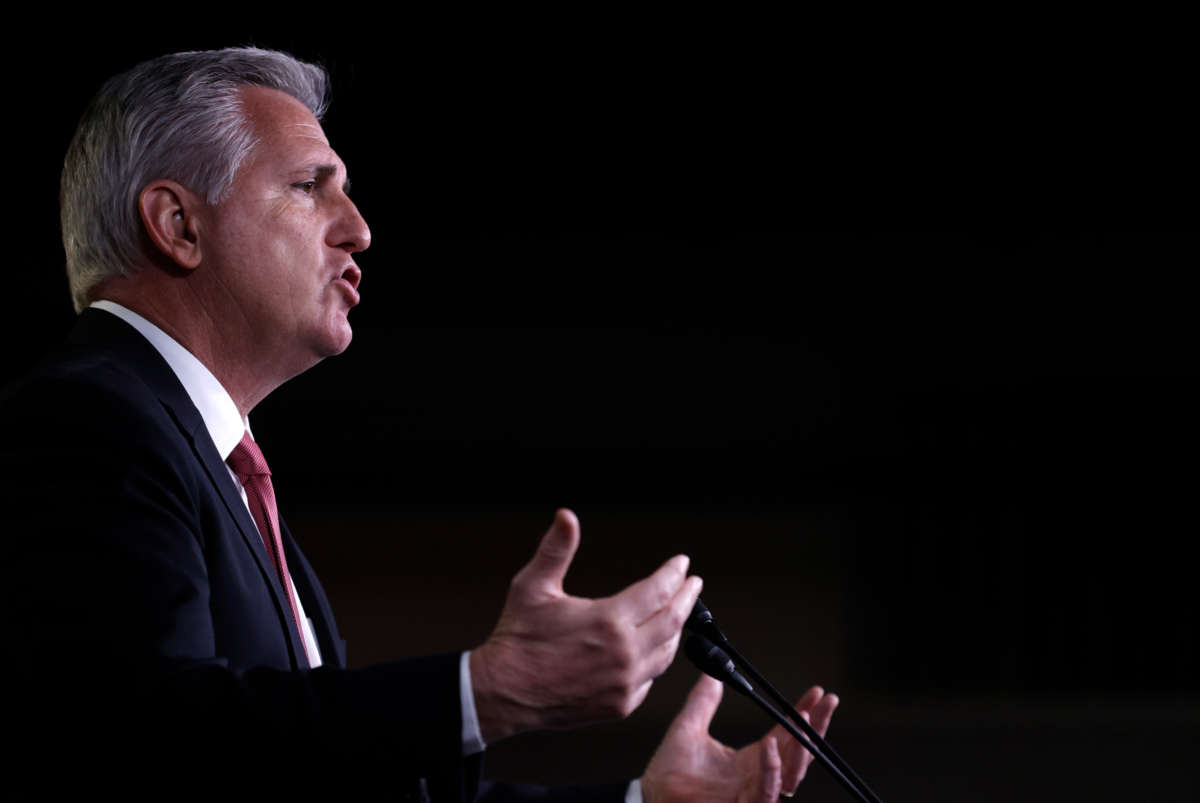House Minority Leader Kevin McCarthy (R-California) falsely claimed that he never took any action to help overturn the outcome of the 2020 presidential race.
McCarthy made the assertions while responding to reporters’ questions during a press conference on Thursday.
The House minority leader denied that he was attempting to flip Arizona in favor of former President Donald Trump during the overall certification process for the Electoral College earlier this month.
“What I voted on wasn’t to overturn an election, because it wouldn’t. It would not overturn it,” McCarthy claimed.
Close to 150 Republicans in Congress voted against certifying a number of state election results during the certification process that took place on January 6 and 7. McCarthy voted against certifying Arizona’s results, citing erroneous claims of election fraud in that state from former President Donald Trump.
The original plan by some Republicans had called for rejecting results in Arizona, Wisconsin, Georgia and Pennsylvania. After a mob of Trump loyalists attacked the Capitol that day, forcing the certification process to be delayed, plans were called off to contest two of those four states.
Had Republicans been successful in contesting those results, Biden would have been denied the presidency, and Trump would be serving a second term in office.
McCarthy’s claims that he didn’t seek to overturn the results may be based upon the fact that both houses of Congress would have had to have agreed to decertify election results in order to be successful. As Democrats controlled the House of Representatives, any attempt to change the outcome would have been — and was — rejected.
However, a vote in favor of overturning a state’s result is not any less an attempt to do so simply because it would have been unsuccessful.
The House minority leader was also among 126 congressional Republicans who signed onto an amicus brief encouraging the United States Supreme Court to decertify the four states’ results. The brief requested that the High Court give Republican-controlled legislatures in those places the authority to select electors instead, a move that the court ultimately rejected.
McCarthy also attempted to change the record on his views of the attack on the Capitol itself, stating that he believed Trump wasn’t responsible for what had happened.
“I don’t believe [Trump] provoked, if you listened to what he said at the rally,” McCarthy said during the press conference.
Last week, however, prior to Trump’s impeachment in the House for his role in the attacks, McCarthy had expressed the exact opposite view.
“The President bears responsibility for Wednesday’s attack on Congress by mob rioters,” McCarthy had said at that time.
The California Republican tried to downplay his own role in pushing misinformation that led to the violence on January 6. McCarthy said he was “very consistent” in denouncing the violence, but avoided taking any blame himself.
According to reporting from Talking Points Memo, when asked about his role in stirring up animosities among Trump loyalists, McCarthy refused to directly answer reporters’ questions on the matter.
Earlier in the day, House Speaker Nancy Pelosi (D-California) indicated that House managers would proceed with presenting evidence at a Senate trial to indict the former president with the single article of impeachment made against him last week.
Pelosi rejected denunciations from several Republicans that were coming to Trump’s defense, as they insisted that an impeachment trial would go against calls for “unity” that Biden was trying to make.
“The [former] president of the United States committed an act of incitement of insurrection,” Pelosi said in response to those claims. “I don’t think it’s very unifying to say, ‘oh, let’s just forget it and move on.'”
We have 10 days to raise $50,000 — we’re counting on your support!
For those who care about justice, liberation and even the very survival of our species, we must remember our power to take action.
We won’t pretend it’s the only thing you can or should do, but one small step is to pitch in to support Truthout — as one of the last remaining truly independent, nonprofit, reader-funded news platforms, your gift will help keep the facts flowing freely.
